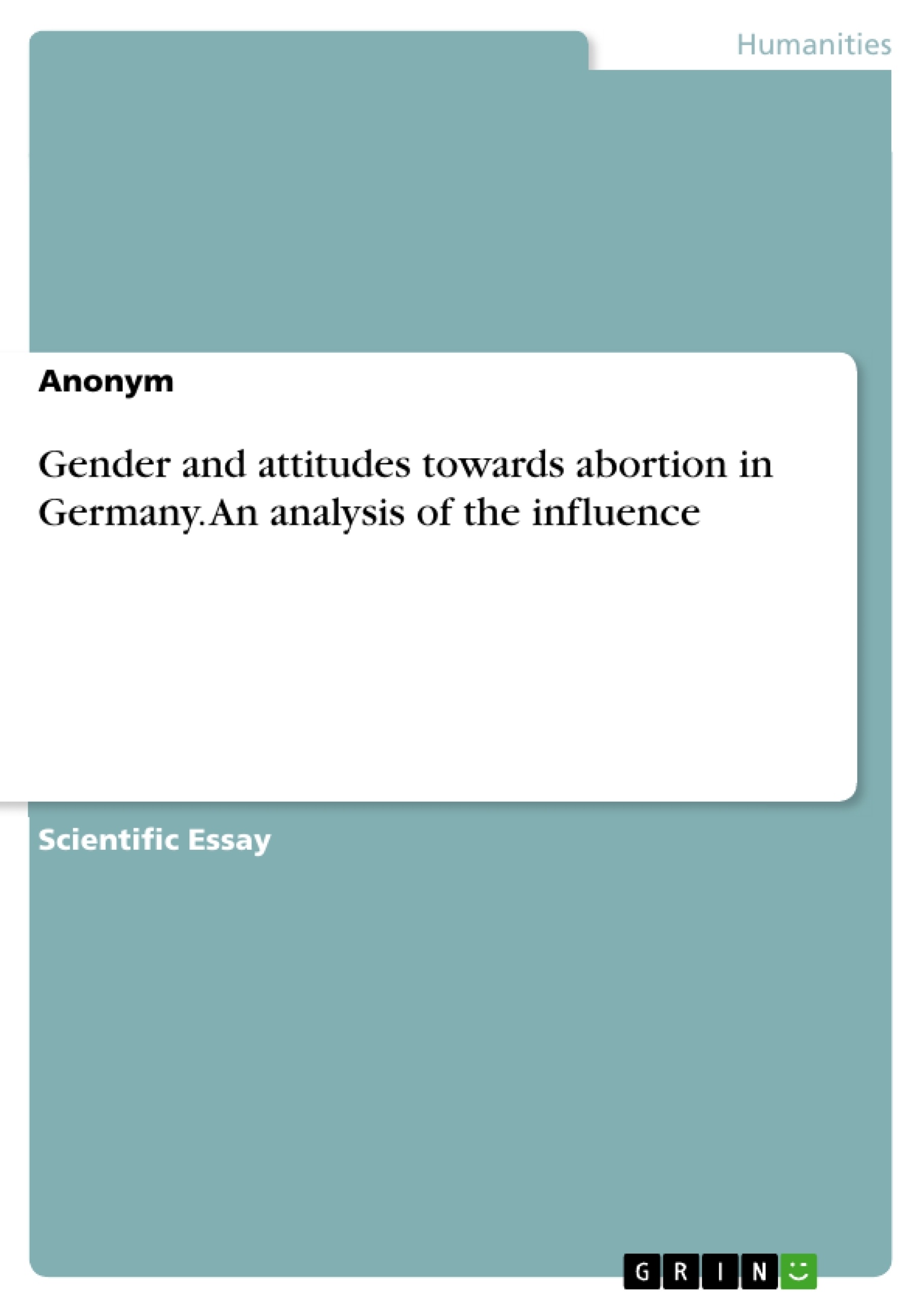This paper deals with the question, whether variables, such as gender, influence the attitude towards abortion. The addressed discourse on abortion is often dominated by women. But even if they are directly affected by the issue, because they are carrying out the pregnancy, it is clear that men cannot be left out of the debate.
Abortion is a difficult and therefore widely discussed moral issue, which is characterized by the fact that different value concepts meet and seem to elude any scientific discourse. The origin of the discussions about the regulation of abortion goes back a long way and yet it flares up again and again. A few months ago, for example, Poland tightened its already strict abortion law even further, declaring abortions unconstitutional due to the possibility of severe malformations of the unborn child.
Overseas, fears of similar measures are growing because of the appointment of pro-abortion opponent Amy Coney Barrett as a Supreme Court judge. Germany, on the other hand, seems to be taking slow but steady steps in the opposite direction. In early 2019, the German Bundestag voted in favor of a new version of Section 219a of the German Penal Code, thus contributing in part to improving information on abortion.
Paragraph 219a not only criminalized physicians quasi unintentionally, but also made it more difficult for those affected to access help. The debate about a change in the "ban on information", was triggered by the case of the physician Kristina Hänel. She was sentenced to a fine in 2017 because she listed the word "abortion" under the heading "spectrum" on her website.
Following the ensuing public debate, the responsible ministers spent several months preparing a new draft law to supplement the advertising ban. According to the bill, medical practices and hospitals will in future be allowed to advertise that they perform abortions. However, they are still not allowed to inform about which abortion methods they offer.
Inhaltsverzeichnis (Table of Contents)
- Introduction
- Research problem
- Research objectives and research question
- Methodology
- Data
- Measurement and Analysis
- Results
- Conclusion
- Bibliography
Zielsetzung und Themenschwerpunkte (Objectives and Key Themes)
The research aims to explore the impact of gender on attitudes towards abortion in Germany. It investigates whether women have a more positive attitude towards abortion than men, drawing on the backdrop of ongoing debates surrounding abortion regulations and the evolving legal landscape in Germany.
- Gender differences in attitudes towards abortion
- The influence of legal regulations on abortion access
- The role of men and women in shaping abortion policies
- The ethical and moral considerations surrounding abortion
- The impact of social and political context on abortion attitudes
Zusammenfassung der Kapitel (Chapter Summaries)
The introduction delves into the complex moral issue of abortion, highlighting the historical context and recent developments in Germany and internationally. It outlines the research question, focusing on whether gender influences attitudes towards abortion, and presents the hypothesis that women in Germany have a more positive stance towards abortion than men.
The methodology chapter outlines the data sources and analytical approaches used in the study. It describes the data collection process, the measurement techniques employed, and the statistical methods used to analyze the data.
Schlüsselwörter (Keywords)
The core keywords and themes of this study include gender differences, abortion attitudes, legal regulations, social policy, ethical considerations, and gender equality. The research focuses on understanding the complex relationship between these factors in shaping public opinion and influencing policy decisions concerning abortion in Germany.
Frequently Asked Questions
Does gender influence attitudes towards abortion in Germany?
The study investigates this relationship and explores whether women generally hold more positive or supportive attitudes towards abortion compared to men in the German social context.
What is Paragraph 219a of the German Penal Code?
Paragraph 219a was a controversial ban on "advertising" for abortions. A 2019 reform allowed doctors to state they perform abortions, but initially still restricted detailed information on methods.
Who is Kristina Hänel?
Kristina Hänel is a German physician whose legal case triggered a nationwide debate on abortion information rights after she was fined for listing abortion services on her website.
How do international developments affect the debate in Germany?
Events like the tightening of abortion laws in Poland or judicial appointments in the US Supreme Court often spark renewed discussions and fears regarding reproductive rights within Germany.
Why are men included in the abortion discourse?
While women are directly affected by pregnancy, men play a significant role in shaping policy, societal values, and support systems, making their attitudes crucial for a comprehensive analysis.
- Arbeit zitieren
- Anonym (Autor:in), 2021, Gender and attitudes towards abortion in Germany. An analysis of the influence, München, GRIN Verlag, https://www.hausarbeiten.de/document/1128390


